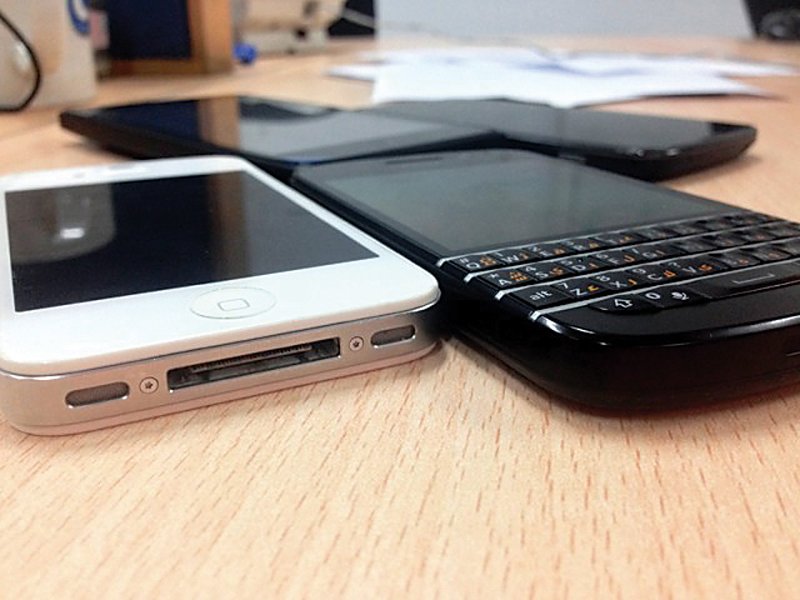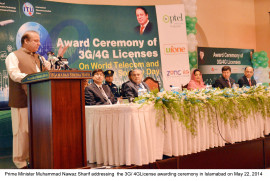
In a recent meeting with Finance Minister Ishaq Dar, a delegation of Chinese companies with expertise in smartphone manufacturing expressed interest in setting up mobile phone manufacturing units in Pakistan.
If the plan materialises, this will be another feather in the cap of Pakistan Muslim League-Nawaz government that has already introduced mobile broadband technology in the country.
The local manufacturing will result in transfer of technology, attract foreign direct investment (FDI), create jobs and provide much-needed boost to the country’s image as an international manufacturing base.
However, the proposal is subject to a debate whether this can be implemented.

The recent auction of third-generation (3G) and 4G mobile spectrum licences would certainly spur the demand for smartphones in the country, the visiting delegates acknowledged.
However, the meeting got a mixed response from the industry and some quarters were sceptical about the project’s economic viability – despite all the incentives Dar promised to the visitors.
Dar offered a special corporate tax rate for FDI in the information technology sector for the next five years, provided the projects are completed in three years ending June 30, 2017.
Besides, the government has already announced that FDI in manufacturing, construction and housing would be subject to 20% corporate income tax as opposed to the standard 33%.
Despite the incentives, manufacturing of smartphones in Pakistan doesn’t make the business case for investors, according to Mudassar Jahangir, Editor of Lahore-based More Magazine that covers the IT and telecom sector.
“Setting up a manufacturing plant is not an issue, our consumption of smartphones is very low, thus the project may not be viable,” said Jahangir, one of the sources expressing doubts about the feasibility of the project.
According to industry estimates, Pakistan is currently a market of 2.5 to 3 million mobile phones a month but smartphones constitute only 10% to 15% of that market.

With such a small market, it will be hard for the government to sell its case as a manufacturing base, Jahangir said.
Asked if exports of made-in-Pakistan phones to the Middle East and Africa would make any difference, he said, “We can’t compete in the international market, especially against established brands of the likes of Samsung, HTC and even Micromax. Additionally, Pakistan doesn’t enjoy a good perception in the international market of electronic products.”
His views are reflected in the policy of most technology companies – Intel, Samsung and Nokia for example – that operate in Pakistan. Top management of these firms says the country’s market isn’t yet ready for smartphone manufacturing as they focus mainly on branding, marketing and sales.
Even Pakistani brands like QMobile and Voice don’t have manufacturing base in the country.
Despite all the difficulties, the possibility of domestic manufacturing of mobile phones can’t be entirely ruled out.
“It [local manufacturing] is difficult and needs a lot of groundwork. However, it is very much possible if the government gives incentives on import duties and taxes as well as other support to the investor,” United Mobile Director Ejaz Hassan said.
The cost of manufacturing in Pakistan is still high, Hassan says, but the plan can be viable if the government gives tax rebate for five years, as announced. However, they will need to conduct a detailed study at the retail level to make it feasible, he said.
The country’s perception is not a big issue. “In the past, made-in-China products were considered substandard, but today they are leading in the world of manufacturing,” Hassan remarked.
Pakistan has to build that kind of perception. India is a good example to follow where Nokia has set up a factory. While Chinese-made Nokia phones were shipped to markets of Europe and America, made-in-India mobile phones tapped the Middle East and Africa, he said.
The idea of mobile manufacturing units is possible, said another official. Dawlance is a Pakistani home appliances company and has successfully expanded into international markets and doing well. “If they can do it, other industries can also do so,” he said.
Published in The Express Tribune, June 9th, 2014.
Like Business on Facebook, follow @TribuneBiz on Twitter to stay informed and join in the conversation.
COMMENTS (4)
Comments are moderated and generally will be posted if they are on-topic and not abusive.
For more information, please see our Comments FAQ










































Any company that is able to setup smartphone manufacturing in Pakistan could easily earn millions of dollars in profits very quickly and it would keep on increasing.
It won't be manufacturing though. Just assembly. We don't have a semi-conductor industry so we can't actual manufacture the critical parts. We can only import them and put them together. The govt. has been trying to rope in cell phone makers for many, many years now. The only difference this time around is that the Chinese have shown interest. Why now? Perhaps because of the rising labour cost in their country. So they are only interested in taking advantage of our cheap labour.
Go for the local market, then improve then go for the Middle Eastern market. It is doable because we have a large number of expats in the area. Things take time and QMobile and Voice are local anyway and they sell locally too!! So it's extemely viable for them to do it.
The only problem is load shedding, if that is fixed we can grow at 10% a year.